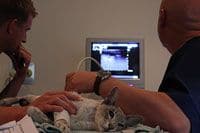My Pet Is Vomiting
A common problem encountered with cats and dogs
Vomiting is a common problem that is encountered with dogs and cats. It is the forceful expulsion of stomach contents and usually contains bile (a yellow fluid). A vomit will usually be preceded by abdominal contractions and retching. Vomiting can be easily confused with regurgitation which is the passive release of stomach contents that is not preceded by abdominal contractions or retching. The causes for regurgitation and vomiting are different and therefore your vet will ask questions to try and determine if your dog or cat is truly vomiting.
Why is vomiting a problem?
Vomiting causes dehydration and electrolyte losses that can quickly lead to depression, lethargy and loss of appetite, especially in small, young or older animals. It is also important to understand that vomiting is always the result of an underlying problem and is not a primary problem. It is the primary problem that must be addressed when managing this symptom and not the vomiting itself. Sometimes the cause of the vomiting has passed but the dehydration caused by vomiting leads to ongoing nausea and illness. This illness can best be described as the worst hangover you have ever experienced.
When to visit your vet?
Veterinary attention should be sought sooner rather than later at your regular vet in order to avoid a trip to the emergency centre. In general, vomiting animals should be seen in the following instances:
- Small breeds and puppies/kittens should always visit a vet when vomiting as they can quickly become dehydrated
- If they are lethargic, lose appetite or depressed
- If they have vomiting 3 or more times in a 24 hour period – Remember, 3 strikes and you are out!
- If they are continuing to vomit longer than a 24 hour period
- If vomiting and diarrhoea are both occurring as the fluid losses quickly lead to dehydration
What causes vomiting?
The main causes of vomiting can be divided into two categories:
- Problems within the gastrointestinal tract
- Problems outside the gastrointestinal tract that can cause nausea
Examples include:
- Foreign bodies (chew toys, string, bones)
- Pancreatitis (sometimes associated with a fatty meal)
- Infections (virus, bacterial)
- Toxin ingestion (compost, blood and bone, snail pellets, drug reactions, mushrooms)
- Diet change (especially for young animals)
- Gastric ulceration
- Gastric dilation and torsion (also known as bloat)
- Indiscriminate eating (garbage ingestion, carcass ingestion, overeating)
- Non-gastrointestinal diseases (some examples provided):
- Kidney disease
- Liver disease
- Endocrine problems
- Neurological disease causing dizziness
- Cancer
- Severe infection
The severity of these conditions can range from very mild to life threatening.
Delayed Skin Test
If you pull on the skin of a dehydrated animal it will very slowly resume its normal shape. In pets that are hydrated the skin resumes its shape instantly
What to expect at the vet
Your vet will ask questions to determine the underlying cause of the vomiting. If an obvious cause is discovered then no further testing may be required and symptomatic treatment can be provided. If there is no obvious cause of the vomiting then your vet may recommend diagnostic tests to determine the cause for the vomiting. These tests may include:
Blood Tests – to estimate the level of dehydration and determine which electrolytes are lost. They can also be used to identify problems with the internal organs that can cause vomiting
Abdominal Radiographs – help to determine if there is a foreign object present or if gas builds up in the intestines signifies an obstruction.
Ultrasound – is used to inspect the structure of the intestines and other abdominal organs
Endoscopy and biopsy – a small video camera can be used to visually inspect parts of gastro-intestinal tract. This test is usually reserved for more chronic episodes of vomiting
What is the treatment?
The treatment will depend on the underlying cause of the vomiting and can include:
- Intravenous fluids to treat dehydration. Sometimes this is all that is required for many of the mild causes of vomiting
- Medications to reduce the acid concentration in the stomach
- Pain relief if your pet appears to be in pain
- Anti-nausea drugs are sometimes used once the underlying cause has been discovered
- Sometimes antibiotics are required
- Abdominal surgery is sometimes required remove objects stuck in the intestines or stomach (i.e. socks, bones, corn cobs)
- Possible diet adjustment (bland diets of boiled chicken and rice are often recommended during recovery)
- Unless the underlying cause is removed, treatment aimed directly at stopping the vomiting by using anti-nausea drugs will only temporarily solve the problem.




